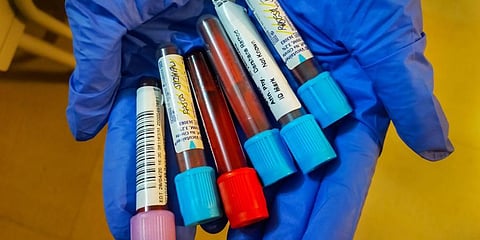

NEW DELHI: Despite a rapid and worrying surge in Covid-19 cases in several parts of the country, the reproductive factor - the rate at which every infected person transmits the disease to others - of the virus in India has gone down marginally over the last few days.
While R0 for SARS CoV 2 was 1.22 in the country before June 7, it came down to 1.15 in the week of June 7-14, an analysis of the disease progression by biophysicists attached to the Institute of Mathematical Sciences, Chennai has shown.
RO, pronounced “R naught,” is a mathematical term that indicates how contagious an infectious disease is. RO, which is also referred to as the reproduction number, indicates how many other people will catch the disease from a single infected person, in a population that hasn’t been exposed to the disease before.
This decline assumes significance especially as many additional places like hotels, religious places, shopping malls, and restaurants were allowed to open June 8 onwards across India.
The analysts who studied the data from 12 worst-hit states in the country found the disease progression to be the highest in Haryana where it was 1.72 followed by Delhi—the city seeing a bad phase in the pandemic currently-- where this figure stands at 1.26.
In Uttar Pradesh, West Bengal, Tamil Nadu, and Andhra Pradesh and Maharashtra, too, this crucial indicator of disease progression is marginally higher than the national average.
For the pandemic to subside, the R0 factor needs to come down under 1.
The analysis also said that in Karnataka, Rajasthan, and Jammu and Kashmir the disease progression is now sub-exponential.
In India, with 10, 667 more Covid-19 cases detected overnight—the total tally has now reached 3,43, 091—of which 1,53, 178 are active cases while 9,900 are dead.
Union Ministry of Health and Family Welfare meanwhile said that the Covid-19 diagnostic testing capacity has now reached 3 lakh per day in the country.
The total number of samples tested thus far is 59,21,069 with 1,54,935 samples tested in the last 24 hours.
The ministry also said that a network of 907 labs has been created which includes 659 labs in the government sector and 248 in the private sector.
These labs include 534 RT PCR based testing labs, 302 True Nat based testing labs, and 71 CBNAAT based testing labs.
The Center also said that while states such as Tamil Nadu, Odisha, Maharashtra, Gujarat, Uttar Pradesh, Rajasthan, Telangana, Karnataka, and Madhya Pradesh have fixed reasonable rates for Covid-19 care in private hospitals, others too should follow the suit.
States have also been asked to proactively engage with the private sector health providers and consider pooling in public and private healthcare facilities, as this will help in providing prompt, good quality and reasonable health care to Covid-19 patients.